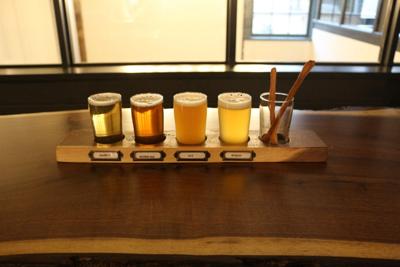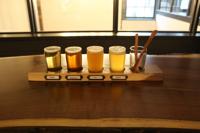The excise tax reduction for craft beverage brewers will be permanent.
U.S. Sen. Charles Schumer, D-N.Y., announced Monday that a reduced excise tax temporarily in place for breweries, cideries, distilleries, wineries and other craft beverage makers has been made permanent.
“Craft beverage producers throughout New York not only brew, bottle and distill great products, but they also attract visitors and pour hundreds of jobs into their local communities,” Schumer said in a statement. “By making permanent the reduced tax rates for New York producers and removing regulatory barriers to accelerate growth, we can help local brewers, vintners, cider makers and distillers make it through this economic crisis.”
The Craft Beverage Modernization and Tax Reform Act, a tax reduction for craft beverage makers, was first passed by Congress in 2017. In December 2020, the Craft Beverage Modernization and Tax Reform Act was passed by Congress and signed by President Donald Trump on Dec. 27, according to the U.S. Treasury Department’s Alcohol and Tobacco Tax and Trade Bureau website. It went into effect Jan. 1.
The new legislation was included in the Fiscal Year 2020 end-of-year omnibus legislation, which was passed in December.
New York state has 462 breweries, 450 wineries, 186 distilleries and 72 cideries, which support tens of thousands of New York jobs and contribute billions of dollars to the state’s economy, according to the Empire State Development website.
“Obviously, anything like this is going to help the bottom line by reducing additional tax burdens,” said Tom Crowell, owner and founder of Chatham Brewing. “It’s definitely a big help and it’s something that’s been in the works for the last couple of years. There’s been some extenders put through, but this makes the change permanent. We really appreciate our local delegates’ help in pushing this through. They’re all co-sponsors of the bill.”
Crowell said COVID has had a dramatic impact on his business and that legislation like this can help.
“Having to shut down inside operations has hurt us not only in the tap room but also on the wholesale side, since a good percentage of our customers are restaurants,” said Crowell. “The second quarter of last year was particularly stressful.”
The craft beer industry has created approximately 29,000 full-time jobs in the state, with an annual economic impact of $4.9 billion, according to the Brewers Association.
The New York Wine and Grape Foundation’s 2019 Economic Impact Study reveals that New York’s wine and grape industry directly created 71,950 jobs and contributes $6.65 billion in direct economic impact.
New York’s distilled spirits industry supports 93,860 jobs and contributes $8.3 billion to the state’s gross domestic product, or GDP, according to the Distilled Spirits Council of the United States.
“It’s great, it’s going to help everyone’s business in the industry,” said Ken Landin, owner of Crossroads Brewing Company Inc. in Athens and Catskill. “It’s wonderful; they’ve been lobbying for that forever. I don’t know exact dollars off the top of my head of what it’s going to save us, but any savings at this point in time, especially because of COVID, is going to be great.”
The brewery and restaurant industry has been greatly impacted by COVID, Landin said. The reduction in excise tax helps businesses like his be able to reinvest some of that money into the business.
“It goes right back into the infrastructure,” said Landin. “It goes wherever we feel the need to invest that money into, whether that be in ingredients, infrastructure, additional equipment. It really helps the bottom line. It’s exciting.”
The excise tax reduction is a boost for these types of businesses, but COVID has created additional expenses as well.
“Foot traffic was down; I don’t think people were traveling as much, and just the incurred costs of operating in a more sanitary way,” said Steven Rosario, owner and wine maker at Hudson-Chatham Winery in Ghent.
“Not that we weren’t sanitary already, but we ended up investing in an ozone machine so we could sterilize our tasting room after each day,” he said. “There were a lot more financial implications that came with being hypersanitary.”
Rosario said every little bit of financial help like the excise tax reduction helps, but the business had to spend money on personal protective equipment for employees and more money on additional furniture and tent rentals to be able to space customers out more.
“I think for us it just gives us a little more room to breathe,” said Rosario. “Other farmers don’t have to pay taxes on growing strawberries, but we have one fruit a year that we grow. So being able to not put out money on something like an excise tax is giving us the opportunity to potentially charge less and extend that for local people to drink local wine at a good price.”
Earlier versions of the permanent excise tax reduction for beverage producers have been in the works for years. Securing permanent federal excise tax recalibration for small brewers has been a top priority for the Brewers Association since 2009.
“It’s something that the industry has been lobbying for for quite a while,” said Ron Bixby, owner and cidermaker at Little Apple Cidery in Hillsdale.
“The state has been promoting small businesses, especially farm cideries and distilleries and farm wineries, and we’re a very small operation,” he said. “The excise tax is kind of a nuisance tax — we’re all in favor of getting rid of it, just like every other producer is, especially during these times. A lot of us are closed down.”
Bixby said his business was closed last year from mid-March to June because of the pandemic. The business reopened with the new guidelines and moved the operation outdoors in an orchard. During the warmer months he was able to space out picnic tables and could have customers come to what was called the Orchard Bar. In November the colder weather forced the outdoor source of business to shut down.
Changes to beverage production can also be seen in the distillery industry, said Brian Facquet, president of the New York State Distillers Guild and founder of Do Good Spirits in Roscoe.
“At the outset of the pandemic our New York Distillers pivoted to manufacturing hand sanitizer to protect our communities,” Facquet said in a statement. “This required many of our members to halt production of distilled spirits, while the rest of the alcohol industry was reporting record sales. We are proud to have done our part, but with reduced tourism, closed restaurants and the inability to market our rising brands, it has been the perfect storm for our small businesses.”









